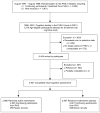Long-term multivitamin supplementation and cognitive function in men: a randomized trial
- PMID: 24490265
- PMCID: PMC3858850
- DOI: 10.7326/0003-4819-159-12-201312170-00006
Long-term multivitamin supplementation and cognitive function in men: a randomized trial
Abstract
Background: Despite widespread use of multivitamin supplements, their effect on cognitive health-a critical issue with aging-remains inconclusive. To date, no long-term clinical trials have studied multivitamin use and cognitive decline in older persons.
Objective: To evaluate whether long-term multivitamin supplementation affects cognitive health in later life.
Design: Randomized, double-blind, placebo-controlled trial of a multivitamin from 1997 to 1 June 2011. The cognitive function substudy began in 1998. Up to 4 repeated cognitive assessments by telephone interview were completed over 12 years. (ClinicalTrials.gov: NCT00270647) SETTING: The Physicians' Health Study II.
Patients: 5947 male physicians aged 65 years or older.
Intervention: Daily multivitamin or placebo.
Measurements: A global composite score averaging 5 tests of global cognition, verbal memory, and category fluency. The secondary end point was a verbal memory score combining 4 tests of verbal memory, which is a strong predictor of Alzheimer disease.
Results: No difference was found in mean cognitive change over time between the multivitamin and placebo groups or in the mean level of cognition at any of the 4 assessments. Specifically, for the global composite score, the mean difference in cognitive change over follow-up was -0.01 SU (95% CI, -0.04 to 0.02 SU) when treatment was compared with placebo. Similarly, cognitive performance did not differ between the multivitamin and placebo groups on the secondary outcome, verbal memory (mean difference in cognitive change over follow-up, -0.005 SU [CI, -0.04 to 0.03 SU]).
Limitation: Doses of vitamins may be too low or the population may be too well-nourished to benefit from a multivitamin.
Conclusion: In male physicians aged 65 years or older, long-term use of a daily multivitamin did not provide cognitive benefits.
Primary funding source: National Institutes of Health, BASF, Pfizer, and DSM Nutritional Products.
Figures
Comment in
-
Enough is enough: Stop wasting money on vitamin and mineral supplements.Ann Intern Med. 2013 Dec 17;159(12):850-1. doi: 10.7326/0003-4819-159-12-201312170-00011. Ann Intern Med. 2013. PMID: 24490268 No abstract available.
Summary for patients in
-
Summaries for patients. Does long-term multivitamin supplementation help cognitive function in men?Ann Intern Med. 2013 Dec 17;159(12):I-24. doi: 10.7326/0003-4819-159-12-201312170-00002. Ann Intern Med. 2013. PMID: 24490273 No abstract available.
Similar articles
-
Effects of cocoa extract and a multivitamin on cognitive function: A randomized clinical trial.Alzheimers Dement. 2023 Apr;19(4):1308-1319. doi: 10.1002/alz.12767. Epub 2022 Sep 14. Alzheimers Dement. 2023. PMID: 36102337 Free PMC article. Clinical Trial.
-
Effect of Baseline Nutritional Status on Long-term Multivitamin Use and Cardiovascular Disease Risk: A Secondary Analysis of the Physicians' Health Study II Randomized Clinical Trial.JAMA Cardiol. 2017 Jun 1;2(6):617-625. doi: 10.1001/jamacardio.2017.0176. JAMA Cardiol. 2017. PMID: 28384735 Free PMC article. Clinical Trial.
-
A trial of B vitamins and cognitive function among women at high risk of cardiovascular disease.Am J Clin Nutr. 2008 Dec;88(6):1602-10. doi: 10.3945/ajcn.2008.26404. Am J Clin Nutr. 2008. PMID: 19064521 Free PMC article. Clinical Trial.
-
Folic acid with or without vitamin B12 for cognition and dementia.Cochrane Database Syst Rev. 2003;(4):CD004514. doi: 10.1002/14651858.CD004514. Cochrane Database Syst Rev. 2003. Update in: Cochrane Database Syst Rev. 2008 Oct 08;(4):CD004514. doi: 10.1002/14651858.CD004514.pub2. PMID: 14584018 Updated. Review.
-
The effect of vitamin B6 on cognition.Cochrane Database Syst Rev. 2003;(4):CD004393. doi: 10.1002/14651858.CD004393. Cochrane Database Syst Rev. 2003. PMID: 14584010 Review.
Cited by
-
Pursuing the Elixir of Life: In Vivo Antioxidative Effects of Manganosalen Complexes.Antioxidants (Basel). 2020 Aug 10;9(8):727. doi: 10.3390/antiox9080727. Antioxidants (Basel). 2020. PMID: 32785017 Free PMC article. Review.
-
Dietary Antioxidants as Modifiers of Physiologic Adaptations to Exercise.Med Sci Sports Exerc. 2015 Sep;47(9):1857-68. doi: 10.1249/MSS.0000000000000620. Med Sci Sports Exerc. 2015. PMID: 25606815 Free PMC article. Review.
-
Vitamin and mineral supplementation for preventing dementia or delaying cognitive decline in people with mild cognitive impairment.Cochrane Database Syst Rev. 2018 Nov 1;11(11):CD011905. doi: 10.1002/14651858.CD011905.pub2. Cochrane Database Syst Rev. 2018. PMID: 30383288 Free PMC article.
-
The Nrf2 Activator Vinylsulfone Reduces High Glucose-Induced Neural Tube Defects by Suppressing Cellular Stress and Apoptosis.Reprod Sci. 2016 Aug;23(8):993-1000. doi: 10.1177/1933719115625846. Epub 2016 Jan 21. Reprod Sci. 2016. PMID: 26802109 Free PMC article.
-
Do antioxidant supplements interfere with skeletal muscle adaptation to exercise training?J Physiol. 2016 Sep 15;594(18):5135-47. doi: 10.1113/JP270654. Epub 2016 Jan 18. J Physiol. 2016. PMID: 26638792 Free PMC article. Review.
References
-
- Small BJ, Fratiglioni L, Viitanen M, Winblad B, Backman L. The course of cognitive impairment in preclinical Alzheimer disease: three- and 6-year follow-up of a population-based sample. Arch Neurol. 2000;57(6):839–44. - PubMed
-
- Rosenberg IH. Challenges and opportunities in the translation of the science of vitamins. Am J Clin Nutr. 2007;85(1):325S–7S. - PubMed
-
- Kennedy DO, Haskell CF. Vitamins and cognition: what is the evidence? Drugs. 2011;71(15):1957–71. - PubMed
Publication types
MeSH terms
Substances
Associated data
Grants and funding
- AG 15933/AG/NIA NIH HHS/United States
- R01 HL034595/HL/NHLBI NIH HHS/United States
- CA 097193/CA/NCI NIH HHS/United States
- T32 AG000158/AG/NIA NIH HHS/United States
- CA 34944/CA/NCI NIH HHS/United States
- R01 HL026490/HL/NHLBI NIH HHS/United States
- T32-AG000158/AG/NIA NIH HHS/United States
- R01 CA040360/CA/NCI NIH HHS/United States
- R01 CA097193/CA/NCI NIH HHS/United States
- R01 CA034944/CA/NCI NIH HHS/United States
- P30 AG062421/AG/NIA NIH HHS/United States
- HL 26490/HL/NHLBI NIH HHS/United States
- HL 34595/HL/NHLBI NIH HHS/United States
- CA 40360/CA/NCI NIH HHS/United States
- R01 AG015933/AG/NIA NIH HHS/United States
- P50 AG005134/AG/NIA NIH HHS/United States
LinkOut - more resources
Full Text Sources
Other Literature Sources
Medical

